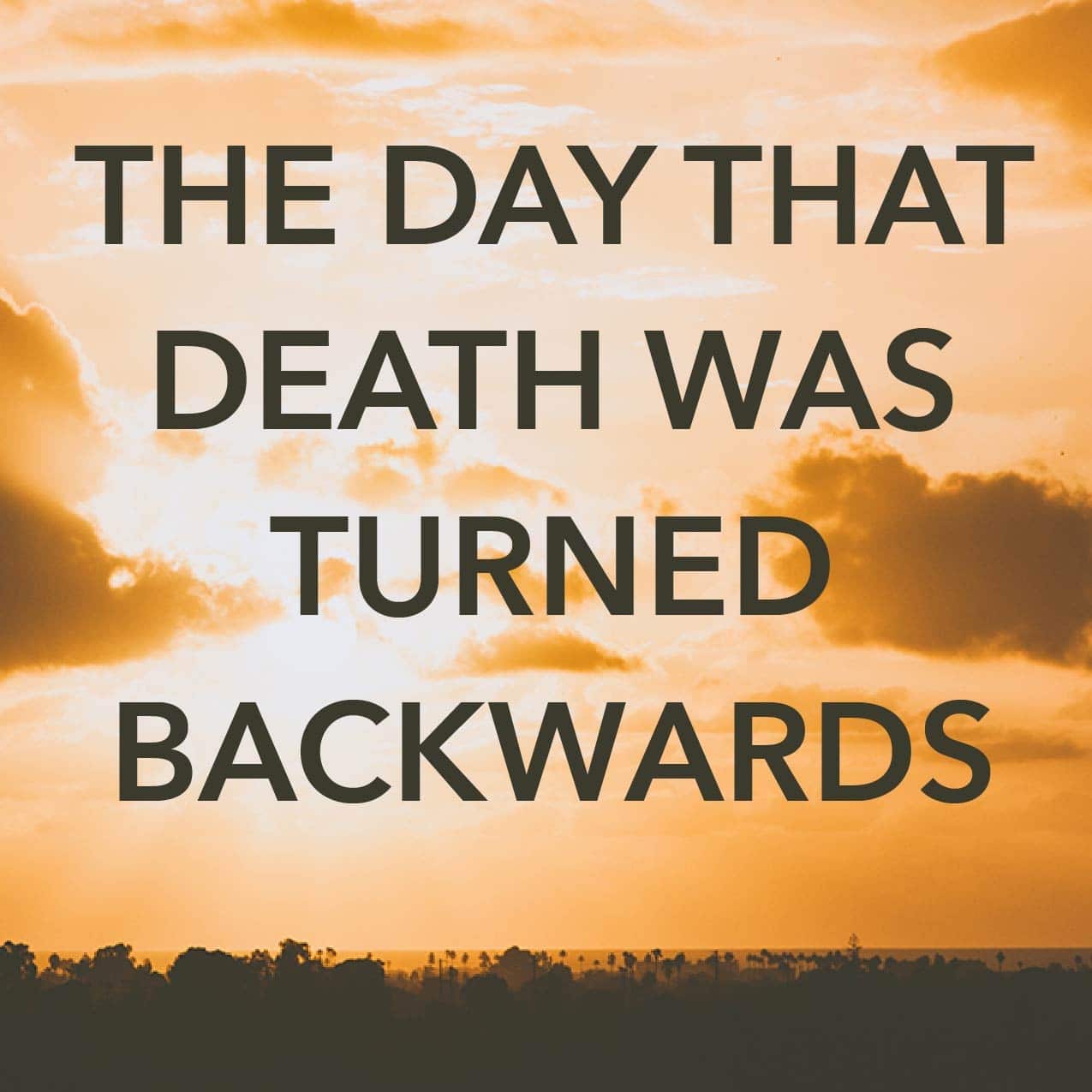Now is Christ risen from the dead. His resurrection has turned to life the power of death binding the human race because of sin. In Adam’s race, all die, but in Christ all shall be made alive…Our Savior, Jesus Christ, has brought life and immortality to light through the gospel. That is the good news of His saving death and resurrection life. (1 Corn. 15:20-22; 2 Tim. 1:10, paraphrased)
Not only will you and I one day die by reason of physical death, our lives are impacted by death-dealing things that happen in this world—things that erode hope, suffocate confidence, break hearts, and kill relationships. You can be alive but things “die” along the way—a business goes bad, a marriage is stressed, a goal you’ve worked toward isn’t realized.
The Scripture says that in the human race (“Adam’s race”) all die. And that is true not only at the end of our lives, but also with the intrusion of death-dealing forces going on around us all the time. But it also says that “in Christ all shall be made alive.” The promise of the Resurrection—to forever to be with the Lord in heaven—is real. But the grammar of these words refers to a continuous action—that all in Christ are continually being made alive. The good news is that Jesus’ resurrection life not only applies to eternity, but also to the present moment in which you and I live.
I want you to look with me at three resurrections that Jesus performed during His ministry, before His own death and resurrection. In the first case, He happened to come upon a funeral. In the second, He didn’t respond to the emergency call of a friend and her brother died. The third is about a man whose daughter died, and Jesus was told, “It’s no use. She’s gone.” But He went anyway.
What I want you to note in these three stories are the responses of the people who were impacted by the death that occurred, because it is the same hopelessness and confusion that Jesus wants to do away with in our lives. All three episodes illustrate how the forces of death intrude on life, and how, by His resurrection power, Jesus turns death backwards, along with the mistaken and fatalistic responses that come with it.
Jesus can reverse the death-dealing power of a hopeless future.
The Widow of Nain and Her Son (Luke 7:11-17)
In the first story, Jesus enters the city of Nain and comes upon a funeral. The text says that “a dead man was being carried out, the only son of his mother; and she was a widow. And a large crowd from the city was with her. When the Lord saw her, He had compassion on her and said to her, ‘Do not weep.’ Then He came and touched the open coffin, and those who carried him stood still. And He said, ‘Young man, I say to you, arise.’ So he who was dead sat up and began to speak. And He presented him to his mother.”
Jesus knew that the widow was not only crying because her son died. She was also grieving because her son would have been old enough to be a wage-earner. He was the hope of their family’s future because in the culture of that time, a widow usually ended up a beggar. Her tears were at the thought she would need to spend the rest of her life sitting in the marketplace and begging alms to survive.
The futility of that circumstance adds dimension to Jesus’ words, for the Bible says He had compassion. His desire was not simply to alleviate her grief, though I’m not suggesting He was passive concerning that. What I’m saying is that there was a larger issue at stake that had to do with the possibility of a hopeless future .
Death is more than just ending up in a box in a hole. Death has to do with things that rob our sense of security, things that intrude upon our lives. Many of us can testify to a time when Jesus met us with the power to reverse what looked futile and hopeless at the time. Where He stepped in, and the power of the living God transcended anything we could bring about on our own. Jesus’ resurrection will reverse the death-dealing power of any hopeless future—long- or short-term—that you or I face.
Jesus can reverse the death-dealing power of confused thinking about God.
Lazarus (John 11:1-44)
Lazarus, Mary, and Martha—a brother and two sisters—were good friends of Jesus. He was some distance away when a report came from the sisters that Lazarus was very sick and in jeopardy of losing his life. But Jesus didn’t go to them right away, and His disciples asked why. Jesus gave them a temporary explanation, because the disciples were going to have to learn the same thing as the sisters would learn. And that has to do with the human tendency to become confused about how we think about God when He doesn’t do things as fast as we think He should.
By the time Jesus arrived, Lazarus had been dead for four days. The Scripture says that when Martha heard Jesus was coming, she went out and met Him, saying, “Lord, if You had been here, my brother wouldn’t have died.”
I’m sure she said it politely, but there must have been an edge to her words. We were counting on You. And nothing happened. If we believe God exists, our human tendency is to think that if we ask, and hope, and do everything we know to implore God, what we expect should happen. We live in a world that will pass judgment on God if He doesn’t show up at the beck and call of every human circumstance, as though He doesn’t have the power, doesn’t love us, or doesn’t exist.
Those are the judgments people make about God which will crowd in on our hearts and shut Him out. We may never say it to anyone, or have the nerve to do what Martha did—to tell the Lord Himself, You let me down. I was counting on You. We carry that confusion inside ourselves. I’m just bewildered, Lord. Bewildered as though we suppose we should understand everything of God’s timing.
One of the most necessary things for us to learn is that we cannot judge God’s interest in us by the way we judge His timing. Let me say that again: We cannot judge God’s interest in us by the way we judge His timing. If the answer doesn’t come when we think it should, the conclusion is drawn that either He’s deficient in His character, or there must be something wrong with us. That causes us to live with guilt, or to steep ourselves in frustration, anger, and resentment toward God, even outright rejection of Him.
Jesus said to Martha, “Your brother will rise again,” to which Martha replied, “I know my brother will rise in the resurrection at the last day.” And Jesus said to her, “Martha, I am the resurrection and the life. ” Right now, Martha, I AM the resurrection and the life!
Martha responded the way some Christians do. Well, Lord, it didn’t work out, but someday, somewhere, somehow, I guess it will. As though God has no resurrection power to bring us through whatever turns a situation into a dead one. Not dead in the way that Lazarus physically died, but in a way that kills feelings in our heart, annihilates trust in our soul, or stifles our readiness to move on in confidence. Yet Jesus’ resurrection confirms with dynamic evidence His ability to turn death backwards—to reverse the death syndrome that intrudes on our lives with confused thinking about God and how He feels about us.
Jesus can reverse the death-dealing power of fatalistic prophecy.
Jairus’ Daughter (Luke 8:40-56)
Jairus, who was the leader of a synagogue, had a twelve-year-old daughter who was dying, and he came to Jesus and begged Him to come to his house. But as Jesus went with Jairus, they were besieged by a crowd; “multitudes thronged Him,” the Bible says. Among them was a woman who had endured a horrible and embarrassing discharge of blood for twelve years. The text says she had “spent all her livelihood on physicians and could not be healed by any.” She pressed in through the crowd and touched the bottom of Jesus’ robe and instantly, she was healed.
But by then, they had been delayed in getting back to Jairus’ house, and someone comes to tells them not to bother, it’s too late. “Your daughter is dead,” he says to Jairus. “Do not trouble the Teacher.” He renders a fatalistic prophecy in the light of the moment. There would be no future, no possibility for anything changing. But Jesus answers with another prophecy: “Do not be afraid; only believe, and she will be made well.” He goes to the house where He tells the mourners to stop their crying. Taking the daughter’s hand, Jesus says, “Little girl, arise,” and the Bible says, “her spirit returned, and she arose immediately.”
The passage ends by saying, “And her parents were astonished…” They had thought, The prophecy has been made, there’s no reason to expect anything now. We had a plan, but it didn’t work. Yet Jesus confirms that He can reverse the death-dealing power of fatalistic prophecy.
Perhaps you have said fatalistic things about your future, a limitation due to circumstances, as you see them. Perhaps, as a kid, you were told by someone, It’s no use, you’ll never be anything, and it’s affected you for a lifetime. A teacher scorned you. A friend mocked you. Kids gave you a bad time. As an adult, you were devalued on the job. Those things can shape our lives and cause us to draw conclusions about ourselves.
Loved one, I’d like to ask you to see what God says to you personally about how each of these three stories applies to your life. What may have taken place that now is reflected in a hopeless future? Have you given up on God because He didn’t show up when you thought He should? Are you frustrated with or angry at Him because what you were hoping for didn’t happen? What fatalistic prophecy has been made about your life that has allowed something of the death syndrome to take root?
As we celebrate Easter, I want you to know that there’s a different kind of prophecy that governs our lives as believers in the living God: it’s the prophecy that Jesus Christ is alive! He came not only to bring us life when we open to Him as Savior, but also to bring hope in the face of a future we can’t imagine, and recovery when we think He’s let us down. By His resurrection power, He can reverse circumstances and turn death backwards whenever and wherever it tries to encroach upon the abundant life He’s promised to you and me. For He proclaims to all, “I AM the resurrection and the life.”



